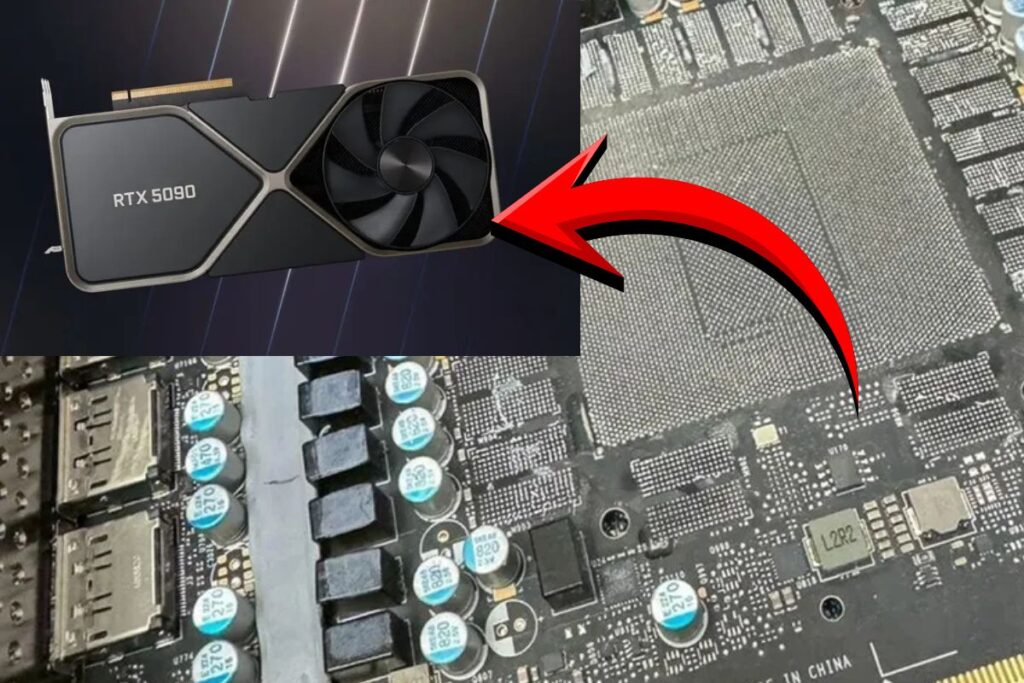We are facing an alarming rise in the number of fraudulent GeForce RTX 5090 graphics cards infiltrating the legitimate distribution channels. A recent incident involving one customer ordering an MSI RTX 5090 from Amazon France showcases a seriously worrying loophole in the global GPU supply chain by which stripped, non-functional GPUs find their way into being reintroduced as “new” products and resold to unsuspecting buyers.
The case underlines that high-demand components, especially the RTX 5090, are increasingly being cannibalised for use in underground AI hardware operations and returned subsequently into circulation without essential chips, substrates, or VRAM modules.
Customer’s Shock upon Receipt: GPU without Main Components
The investigation got underway when the customer took delivery of his RTX 5090 without a tamper seal securing the rear screws. That’s an immediate red flag for a product that is sold and shipped directly by Amazon. When he powered up the system, the graphics card refused to function. Closer examination revealed:
Dull, worn PCIe connector – not consistent with a factory-new GPU.
Thermal pads over vacant VRAM locations indicate that components had been removed post-manufacturing.
The substrate of the GPU is missing completely, leaving only the bare solder pads on the PCB.
Full disassembly revealed that the GPU die and modules of memory modules were physically torn from the board, a clear signature of illicit component harvesting.
How Stripped GPUs Enter the Market: The Rise of Chinese “Conversion Labs”
Our findings verify many reports about unauthorized Chinese labs intercepting or acquiring RTX 5090 shipments. This is because China is facing bans on advanced AI chips, so RTX 5090 units are in extremely high demand in the underground ecosystem for AI.
Inside these labs,
Removing the GPU die and GDDR7 memory chips from retail cards:
These are soldered onto customized AI accelerator PCBs, which have been repurposed for AI server clusters.
Those then-populated RTX 5090 PCBs, no longer of use, are cycled right back into the global supply chain, often camouflaged as new or returned parts.
This creates a self-reinforcing cycle where high-performance chips are shifted into restricted regions under the radar while worthless PCBs are pushed back into the mainstream retail channels.
Price anomalies and discrepant pictures indicate a previous return or interfered-with unit
Most notably, the buyer purchased the GPU well under common MSRP levels—around €1,900, despite RTX 5090 models averaging upwards of €2,200 across Europe. Adding to that, inaccuracies in the images provided by the user themselves show differences in placement of thermal pads, hinting the unit might have been:
A product previously returned,
A refurb sold as new, or
A GPU sourced from an unverified inventory pipeline.
No matter the origin, the appearance of the stripped PCB most definitely confirms that tampered hardware can reappear, even through top-tier sellers.
Why These Incidents Are Increasing: Demand, Restrictions, and Profit Motives
With class-leading performance in AI workflows, the RTX 5090 is a prime target for repurposing into large-scale training clusters. The combination of:
Strict hardware limits set by China
Increased demand for AI compute worldwide, and
High margins of profit from chip harvesting
It creates an ecosystem of systemic fraud. In this light, even the devices made by large platforms such as Amazon are increasingly being affected.

